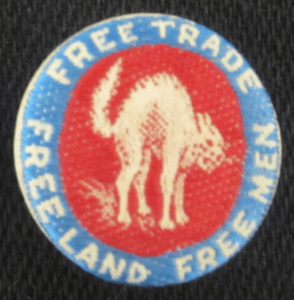
Roger Simmermaker takes the The Wall Street Journal‘s editors to task for warning that Donald Trump will “lose” a “war with the laws of economics” if he wages a trade war with China (“Washington and Lincoln Were Also Tariff Men,” December 13). Simmermaker admits that Trump’s tariffs will reduce the availability of imported goods to domestic consumers, but simply considers buying American instead an inherently good thing.
Simmermaker notes that Trump is by no means the first American president to enact tariffs. He quotes a lineage of eager support for restricting trade running all the way back to George Washington. In an earlier column, Garrison Center director Thomas L. Knapp explained why: “Tariffs help a few people visibly and in a big way, while harming a lot of people far less visibly and far less noticeably. Politicians typically love policies like that because such policies allow them to rack up votes and campaign contributions from some constituencies without enraging others.” Teddy Roosevelt’s proud embrace of the tariff created far more trusts than he busted; its opponents at the time aptly named it “the mother of trusts.”
Simmermaker makes it clear that he doesn’t value the economic well-being of the Chinese as much as that of his fellow Americans, but he would have to be particularly spiteful to harm the latter by cutting off mutually beneficial trade with the former. As the genuine populist Henry George noted in 1886, “Trade has ever been the extinguisher of war, the eradicator of prejudice, the diffuser of knowledge.” Simmerman should take heed of George’s warning that “What protection teaches us, is to do to ourselves in time of peace what enemies seek to do to us in time of war.”
Simmermaker asks why, if tariffs are so economically damaging, has the United States, whose Constitution “never mentions free trade or free markets,” prospered with such a long history of them? Indeed, the new nation’s laws promptly set about the same “cutting off our trade with all parts of the world” that the Declaration of Independence denounced the British monarchy over. Yet it retained enough that Bertrand Russell noted “the leadership [in international trade] has passed to the United States” — the country that had the best chance of replicating the golden ages of previous merchant havens like Italy and Holland. Ironically, American newspapers can still afford to run letters like Simmermaker’s in large part because Trump failed to enact tariffs on inexpensive newsprint from Canada.
The United States has also had the advantage of a huge internal expanse for its economy to reap the benefits of borderless trade. In a time when the Civil Aeronautics Board imposed the economic equivalent of tariffs on airplane flights between states, the airline Southwest was able to supply low-cost air travel within the vast state of Texas. After such barriers were repealed, their advertising told consumers that “You are now free to move about the country.” Similar gains from trade need only not be blocked to soar around the globe.
New Yorker Joel Schlosberg is a contributing editor at The William Lloyd Garrison Center for Libertarian Advocacy Journalism (thegarrisoncenter.org).
PUBLICATION/CITATION HISTORY
- “Protectionist Presidents are the Parents of Our Country’s Trusts,” by Joel Schlosberg, Ventura County, California Citizens Journal, 12/18/18
